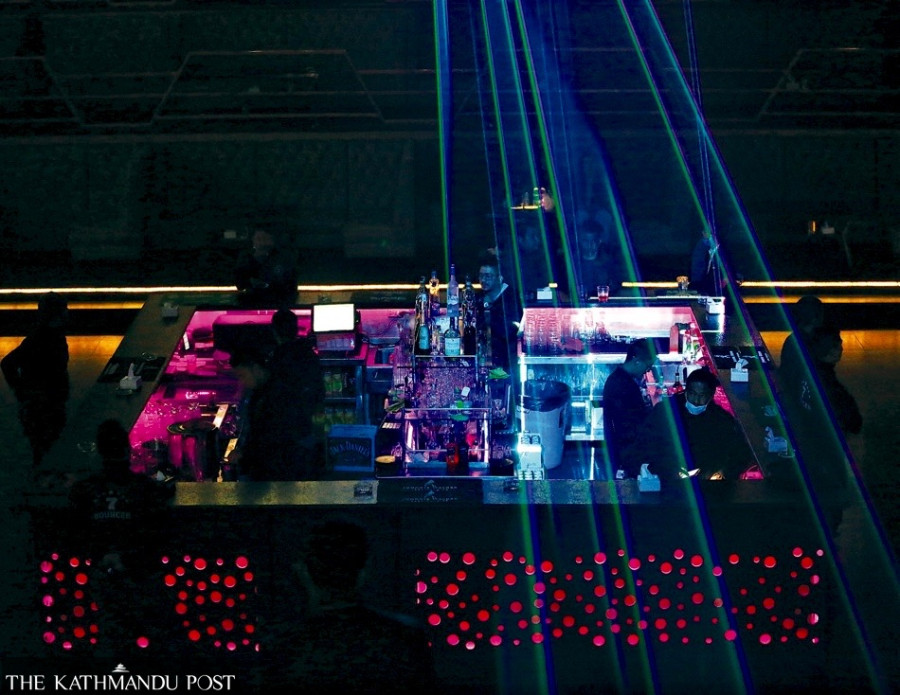Valley
Thamel’s night business operators submit keys to their shops to CDO
They have accused the government of letting other businesses open and restricting only theirs.
Anup Ojha
On Sunday, a group of night business owners from Thamel submitted the keys to their stores and businesses to Kathmandu Chief District Officer in protest of prolonged Covid-19 restrictions.
Authorities have still not allowed pubs, restaurants, clubs and other places of nighttime entertainment to operate, even though they have largely lifted the restrictions on other businesses. The prohibition has greatly affected the nighttime businesses of Thamel, Kathmandu’s tourist hub.
“Everything is open now. It’s only our business that the government wants closed,” said Subash Gharti Chhetri, a club owner at Thamel.
Chhetri was part of the delegation that handed over the keys to more than one hundred shops and businesses to Kathmandu CDO along with a memorandum.
Thamel has been wearing a deserted look ever since the first wave of Covid-19 hit the country and Nepal went under a lockdown on March 24 last year. Although the nighttime businesses resumed after the lockdown was lifted, they were shut again after the authorities enforced prohibitory orders in late April when the second wave of infection gripped the country.
According to Thamel Tourism Development Council, Thamel has over 200 nighttime businesses with average daily turnover of Rs50 million. The Covid-19 pandemic and subsequent restrictions have upended these businesses.
Things have been particularly hard for business owners like Chhetri, the club owner. The 33-year-old said he had only just opened the club when the pandemic hit the country.
“I had invested Rs80 million in the club. The business had to be closed after just three months,” he said.
The restrictions on nighttime businesses in Thamel have also caused many job losses.
Chhetri said he had to let go of over three dozen staff employed at his club.
The councils’ report shows that the night businesses at Thamel employed over 30,000 people, but all are unemployed now; 60 percent of them were laid off after the first lockdown last year.
Sahara Khadka runs Kathmandu’s first openly LGBTIQ-friendly restaurant and bar at Thamel.
She said besides financial hardship, the ongoing restrictions have also denied safe space for many LGBTIQ people.
“If the government is collecting taxes from businesses, it should also allow businesses to operate,” she said. “The government has kept the entertainment industry on its lowest priority but it should understand that many lives depend on it.”
She said if the government intends to keep the nighttime businesses closed indefinitely, it should come up with a plan to compensate them.
Ashok Thapa, secretary of Night Business Association and a bar owner at Thamel, said the nighttime public movement was markedly low these days and that safety should not be an issue if the nighttime businesses were allowed to reopen.
“We are ready to follow the health and safety protocols to run our operations safely,” said Thapa.
He said because of the pandemic he was forced to lay off half of the staff at his bar.
Earlier, the delegation of Thamel-based nighttime business operators had submitted a letter to the Ministry of Tourism, demanding that all businesses at Kathmandu’s tourist district be allowed to operate without any restrictions.
“We have been informed that the ministry has already written to the Covid-19 Crisis Management Centre and it has also directed Kathmandu's CDO to do the needful. But so far our concern remains unaddressed,” said Thapa.
Kathmandu CDO Kali Prasad Parajuli said his office was considering the matter.
“The current prohibitory orders will expire Wednesday. We will decide what to do when we meet again to review the prohibitory orders,” said Parajuli.




 12.28°C Kathmandu
12.28°C Kathmandu.jpg)














